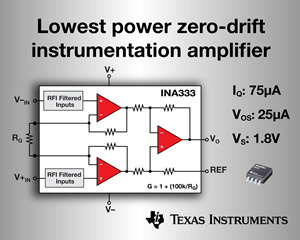Providing an unmatched combination of precision, low power and low supply voltage, Texas Instruments Incorporated introduced the industry’s lowest power zero-drift instrumentation amplifier. The device features the lowest quiescent current and lowest input bias current versus the nearest competition, as well as an impressive power-to-noise ratio, very low offset voltage/drift and 1.8 V operation. Consequently, the INA333 improves accuracy and stability while extending battery life in a variety of precision, low-power applications such as portable medical, handheld instrumentation, weigh scales and data acquisition.Special filters have been integrated in series with the inputs of the INA333 to reduce radio frequency (RF) interference. This can dramatically reduce susceptibility to RF-induced offset voltage variations, which can be a critical advantage in applications that require DC stability, such as weigh scales.Learn more at the TIweb site.
TI unveils lowest power zero-drift instrumentation amplifier for portable, precision applications
